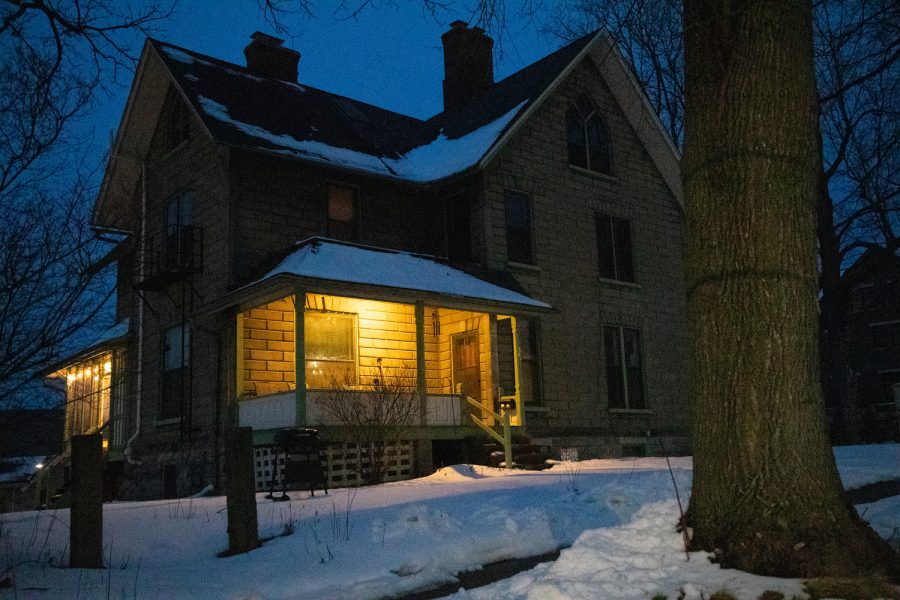Iowa City co-housing rebuilds after membership losses
Iowa City’s River City Housing Collective experienced membership losses as a result of the COVID-19 pandemic, but are now seeing an increase in interest for membership and housing.
The Anomy House of the Co-Housing community is seen in Iowa City, Iowa on February 18, 2023.
February 21, 2023
River City Housing Collective has made several changes to its existing policies to attract more residents. The alternative housing option in Iowa City that focuses on affordability is looking to regain pre-pandemic membership numbers.
The collective owns three houses composed of 35 units, but only two of the houses are currently being rented out because of membership loss.
Alternative housing is used to describe a category of structures that are designed or built in non-standard ways. For example, this includes housing collectives or co-housing options that are designed for affordability and have community responsibilities for members.
Amanda Bloomer, a non-residential staff member at River City Housing Collective, said the collective had membership losses early in the COVID-19 pandemic.
“Congregate housing kind of went against every natural inclination and public recommendations for living,” Bloomer said.
In response to COVID-19, the housing collective required masks in common areas and moved house meetings to Zoom, as previously reported by The Daily Iowan.
Bloomer said the collective is seeing an increase in interest in co-housing. The three homes in the collective are located at 802 E. Washington St., 935 E. College St, and 200 S. Summit St. in Iowa City.
“For a minute, it was like, we’d start to get some more interest, and then there would be delta, and then there was the omicron,” Bloomer said in reference to the COVID-19 variants. “It’s like, we just kept getting some interest and having people kind of back out of the process due to those circumstances.”
Given the organizational structure of the River City Housing Collective, member rent doesn’t depend on inflation but rather the group’s vote of what to increase rent to, Bloomer said.
“Rent rates are not handed down to our members,” Bloomer said. “They are expected to be responsible stewards in voting on their own rent increases and making sure that those rent rates maintain, are below the average small market area rental rates.”
Bloomer said rent decisions also must consider the location of the housing collective and the fact that the three homes are historic. To stay affordable, she said, the collective looks at alternative sources of income from fundraising and grants.
Jude Stewart, a four-year resident of the River City Housing Collective and secretary on its board of directors, said rent is not an issue for him.
“So, even though I work part-time, and I make more than $15 an hour, I am able to pay rent pretty much without problem,” Stewart said.
Stewart said as secretary, he takes notes at the biweekly Board of Directors meetings for the collective, which assists him in fulfilling the collective required hours of tenants.
“Every month, you’re supposed to put in a certain amount of hours,” Steward said. “That can be cooking dinners, cleaning, doing chores — things like that — but because I am disabled, I struggle to meet the same requirements as everybody else. So, having this secretary position makes it so that I’m able to pull my weight at the same rate as everybody else.”
He said that having fewer members in the collective has its downsides, but it allowed members to create stronger bonds with one another.
Other alternative forms of housing in Iowa City have been hit hard by COVID-19, including the Prairie Hill Cohousing, which was the first co-housing community in Iowa City.
Nan Fawcett, a member of the Board of Managers for Prairie Hill, said the houses are intentionally built with solar panels, quality windows, and insulation to allow for energy efficiency.
“We really wanted to live right and build right, so we built everything extremely sustainably, which means it’s expensive, but we don’t make any money on it,” Fawcett said.
Prairie Hill Cohousing, located at 140 Prairie Hill Lane, closed on its first home in April 2018, Fawcett said. By the end of the year, it had closed on 14 homes.
“That went really fast in the beginning. Then the pandemic came along, so everything had to slow down — hard to get supplies for the builders,” she said.
Fawcett said it is an exciting time for the community because there is only one building to finish before Prairie Hill is done with its development.
“We’ve been working from the very beginning trying to make some of these units affordable,” she said. “And we got a grant, and so we have helped a couple families, but the pandemic kind of screwed everything up because we had one unit, one home, that is still available that we were saving for a family of reduced income, and we got a grant to help with that.”
Given how the pandemic has increased prices, Fawcett said the specific housing unit is no longer affordable to those who were qualified for it. As a result, the unit was put on the open market.



